

DOCUMENTA. Alpha: Computational Knowledge Engine. Clemense (@clemense) sur Twitter. Clemense the elven point of view. WebBrain. Willkommen bei Facebook - anmelden, registrieren oder mehr erfahren. XING - Das professionelle Netzwerk. Neues Datenbanksystem: Xing analysiert seine Community in-Memory - CIO.de.
KomNet. yEd - Graph Editor. yEd is a powerful desktop application that can be used to quickly and effectively generate high-quality diagrams.
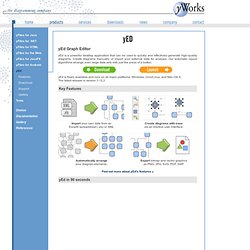
Create diagrams manually, or import your external data for analysis. Our automatic layout algorithms arrange even large data sets with just the press of a button. yEd is freely available and runs on all major platforms: Windows, Unix/Linux, and Mac OS X. The latest release is version 3.12.2 Key Features Import your own data from an Excel® spreadsheet (.xls) or XML Create diagrams with easevia an intuitive user interface. Automatically arrangeyour diagram elements. Export bitmap and vector graphicsas PNG, JPG, SVG, PDF, SWF yEd in 90 seconds Supported Diagrams yEd supports a wide variety of diagram types. Support Resources The yEd online support resources include the yEd Graph Editor manual and the yEd forum where you can give us feedback.
Cognitive Edge. Knowledge management. Knowledge management (KM) is the process of capturing, developing, sharing, and effectively using organizational knowledge.[1] It refers to a multi-disciplined approach to achieving organisational objectives by making the best use of knowledge.[2] An established discipline since 1991 (see Nonaka 1991), KM includes courses taught in the fields of business administration, information systems, management, and library and information sciences.[3][4] More recently, other fields have started contributing to KM research; these include information and media, computer science, public health, and public policy.[5] Columbia University and Kent State University offer dedicated Master of Science degrees in Knowledge Management.[6][7][8] History[edit] In 1999, the term personal knowledge management was introduced; it refers to the management of knowledge at the individual level.[14] Research[edit] Dimensions[edit] The Knowledge Spiral as described by Nonaka & Takeuchi.
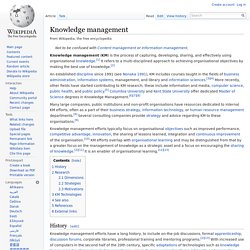
Strategies[edit] Wissensmanagement. Wissensmanagement [-ˌmænɪdʒmənt] (englisch knowledge management) ist ein zusammenfassender Begriff für alle strategischen bzw. operativen Tätigkeiten und Managementaufgaben, die auf den bestmöglichen Umgang mit Wissen abzielen. Beiträge zum Wissensmanagement – theoretischer wie praktisch-anwendungsorientierter Art – werden in vielen Disziplinen entwickelt, insbesondere in der Betriebswirtschaftslehre, der Informatik, der Informationswissenschaft, der Sozialwissenschaft, der Pädagogik oder der Wirtschaftsinformatik. Individuelles versus strukturelles Wissen[Bearbeiten] Definitionen[Bearbeiten] Bei organisationalem Wissensmanagement sollen individuelles Wissen und Fähigkeiten (Humankapital) systematisch auf unterschiedlichen Ebenen der Organisationsstruktur verankert werden.
Diesen beiden Extremausprägungen entsprechen den beiden fundamentalen Strategien des Wissensmanagements, die im Englischen bezeichnet werden mit „People-to-Document“ (Kodifizierung) bzw. SECI-Modell. Transformation des Wissens Die zwei Dimensionen des Wissens Aufbauend auf dem 1966 von Michael Polanyi vorgestellten Begriff des impliziten Wissens entwerfen Nonaka und Takeuchi ein Modell, bei dem Wissen in einer kontinuierlichen Transformation zwischen implizitem und explizitem Wissen erzeugt wird.
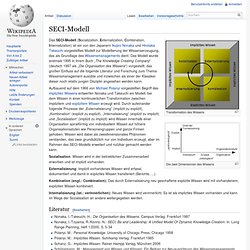
Durch aufeinander folgende Prozesse der „Externalisierung“ (implizit zu explizit), „Kombination“ (explizit zu explizit), „Internalisierung“ (explizit zu implizit) und „Sozialisation“ (implizit zu implizit) wird Wissen innerhalb einer Organisation spiralförmig von individuellem Wissen auf höhere Organisationsstufen wie Personengruppen und ganze Firmen gehoben. Wissen wird dabei als zweidimensionales Phänomen verstanden, das zwar grundsätzlich nur von Individuen erzeugt, aber im Rahmen des SECI-Modells erweitert und nutzbar gemacht werden kann. Sozialisation: Wissen wird in der betrieblichen Zusammenarbeit erworben und ist implizit vorhanden. Ikujirō Nonaka. Ikujirō Nonaka (jap.
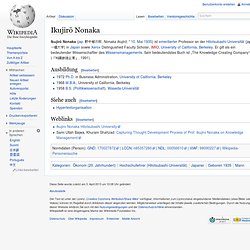
野中郁次郎, Nonaka Ikujirō; * 10. Mai 1935) ist emeritierter Professor an der Hitotsubashi-Universität (jap. 一橋大学) in Japan sowie Xerox Distinguished Faculty Scholar, IMIO, University of California, Berkeley. Er gilt als ein bedeutender Wissenschaftler des Wissensmanagements. Sein bedeutendstes Buch ist „The Knowledge-Creating Company“ (「知識創造企業」, 1991). Hitotsubashi University ICS - MBA Japan. Ikujiro Nonaka Professor Emeritus International Business Strategy Professor Nonaka was appointed Professor Emeritus in 2006, and First Distinguished Drucker Scholar in Residence at the Drucker School and Institute, Claremont Graduate University in 2007.
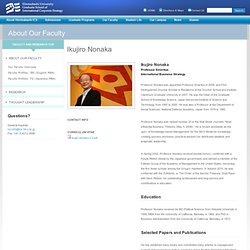
He was the Dean of the Graduate School of Knowledge Science, Japan Advanced Institute of Science and Technology from 1997 to 2000. He was also a Professor at the Department of Social Sciences, National Defense Academy, Japan from 1979 to 1982. Professor Nonaka was ranked number 20 in the Wall Street Journal’s “Most Influential Business Thinkers (May 5, 2008).” In Spring 2002, Professor Nonaka received double honors, conferred with a Purple Ribbon Medal by the Japanese government, and elected a member of the Fellows Group of the Academy of Management in the United States, becoming the first Asian scholar among the Group’s members.
Education Selected Papers and Publications Current Research and Activities. Knowlegde management.